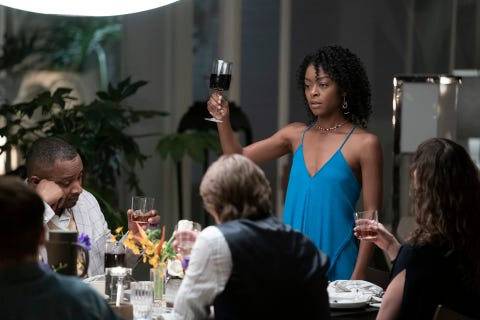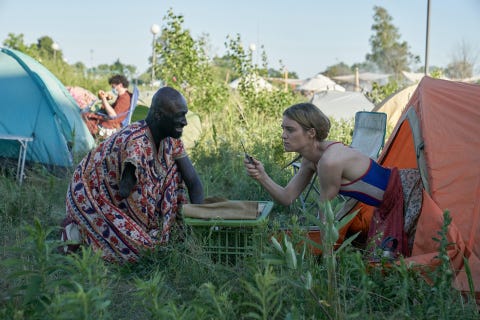When the coronavirus pandemic first sparked panic across America in early 2020, Emily St. John Mandel's 2014 novel, Station Eleven, acquired the power of prophecy. This was, of course, an exaggeration—nothing
we've experienced as a country in the months since lockdown has resembled the complete wipe-out of civilization that characterizes Mandel's fictional tale of the virulent Georgia Flu. Still, there was a flicker of familiarity in her text that readers recognized, that they turned to guidance.
As a recent profile in Esquire explores, Mandel's inbox exploded during those first few months. Fans wanted her take on their present reality, a time of confusion and death and what felt like cataclysm. Never mind that the world would move on, remote work and vaccine passports suddenly commonplace. Uncomfortable with her new status as a pandemic soothsayer, Mandel juggled the virtual tour for her new book, The Glass Hotel, with repeated comment requests about Station Eleven. Her earlier work had acquired sudden, refractory resonance. What had already been a beloved novel was now, in this new environment, a lifeline.
Nearly two years into this crisis, we're sick of such pandemic stories. Anything that reeks of contagion we'd prefer to shelve for a more stable, normalized time. This presents a unique challenge for the HBO Max adaptation of Station Eleven, which was created by The Leftovers’ Patrick Somerville and is set to premiere the first threeof its 10 episodes on December 16.
Several critics have already pointed out this Sisyphean boulder HBO must confront: “This limited series...is about a global pandemic that wipes out most of humanity, and I am assuming I’ve scared off at least half of you already,” wrote the New York Times' James Poniewozik when describing one of the best TV shows of the year. Vulture's Jen Chaney took a similar approach in her review of the show: “I know what you’re going to say about Station Eleven, and I get it. After nearly two years of living through a pandemic in real life, the last thing you want to do is watch a show about a pandemic.”
But, as they both go on to argue, this aversion is misplaced. There is absolutely no better time to watch this onscreen pandemic play out than right now, in the midst of our own.

Station Eleven is not your stereotypical apocalypse epic. For one thing, there are no zombies, aliens, robots, or other sci-fi creatures stalking through the night, eager to feast on weary stragglers. Its villains are normal humans, though complex ones, and their decisions often reflect more about their personal traumas than the threat of the landscape. The characters are dressed in floral skirts, Speedos, and salvaged organza, not military fatigues or blood-splattered denim. Their world of 2040 is vivid and warm, not the washed-out wasteland of The Road or I Am Legend. Even the most chilling scenes are luminescent. Our protagonists sing, not merely requiems but Christmas carols, too. There’s a spirit here that's often absent in the most recognizable doomsday thrillers.
As the timeline alternates artfully back and forth between pre-pandemic and post-, the arc of the plot rests on Kirsten Raymonde (Mackenzie Davis), an actor with the Traveling Symphony. This Symphony prides itself on traversing the Great Lakes region over and over again, so that, at the same time every season, they may return and perform Shakespeare to the collection of encampments and small towns that have popped up since Year One. Their motto is simple but profound, co-opted from Star Trek: “Survival is insufficient.” Even after the world has ended and basic needs are a challenge to meet, human beings require a reason beyond instinct to endure. Art, love, joy, hope—these, too, must outlast the disease.
“There's a spirit here that's often absent in the most recognizable doomsday thrillers.”
We see this theme recur in the early days of Station Eleven's Georgia Flu, when a young Kirsten (played by an absolutely magnificent Matilda Lawler) is taken under the wing of Jeevan Chaudhary (Himesh Patel), whom she meets by happenstance during an evening performance of King Lear. They've both just witnessed the death of mega-celebrity Arthur Leander (Gael García Bernal) onstage, and Jeevan—caught off-guard by a message from his physician sister, who warns the flu is far more dangerous than the news networks are reporting—realizes he can't leave Kirsten alone to fend for herself. A split-second decision binds the two of them together forever, as they hunker down with Jeevan's brother, Frank (Nabhaan Rizwan), in his spaceship-like Chicago apartment. The days creep by as food and electricity dwindle. Absent of heat, Frank's enormous glass windows grow frosty and opaque. Yet we witness much more than these haunting hallmarks of death. We watch Frank burst out into rap, Kirsten stitch together costumes for a play, and Jeevan construct a blanket fort as his personal hideaway. Even in this extreme version of lockdown, there is something akin to innocence, something akin to play—something we, mired in our own pandemic traumas, hunger for.
If the video game saga The Last of Us was about the enduring darkness of humanity, even in the face of real monsters, then Station Eleven is about the enduring need of humanity, even in the face of death, to discover meaning. Throughout the series, Kirsten carries with her a graphic novel called Station Eleven, written and illustrated by Arthur Leander's ex-wife Miranda Carroll (a breathtaking Danielle Deadwyler). The comic's meta-universe depicts a space station in the wake of Earth's alien abduction, wherein a group of rebels escape via wormhole. But after years on the station, the people of the ship's so-called “Undersea” wish only to return home. Over the years, Kirsten reads and re-reads this story obsessively, so that phrases from the comic—such as “I remember damage” and “There is no before”—ooze into her vocabulary, first as a coping mechanism and, later, as a foreboding sort of code. The eerie prescience of this language is only heightened when she encounters the Prophet(Daniel Zovatto), the only person she's ever met who recognizes and can repeat lines from her book.

Their connection becomes clear eventually, andSomerville takes pains to transform Mandel's book Prophet into a more nuanced, if slightly confused, character for the screen. In fact, Station Eleven the series makes a significant number of changes from the book, some of which work better than others. But even when these changes blur the show's intended takeaways, the result is no less fulfilling. If anything, these blurs create avenues for exploration—knots to untangle, meaning to divine, a text rich for analysis.
Station Eleven is, admittedly, a challenging show to watch, especially now, as audiences have only begun to process the collective loss of the past two years. But, like with a good therapy session, there can be growth even in painful exercises. Station Eleven is a show I feel I'll watch more than once, just as I've repeatedly returned to Mandel's book to sift new treasures. There are scenes I want to dissect again, characters I'd love to cry with, pieces of dialogue I hope to turn over in my head. None of this desire is masochistic. I don't wish to wallow in pandemic-era imagery, only to heal from the imagery I've already endured. Station Eleven recognizes that these images don't disappear; they simply acquire new meaning. Like Shakespeare, art is a living thing, its resonance shifting with the era. And like the nomads of the Traveling Symphony, we all must find a way to process what we've suffered. What better time to startthan now? And what better way than with the innocence, beauty, and gravitas of a brilliant piece of art?

